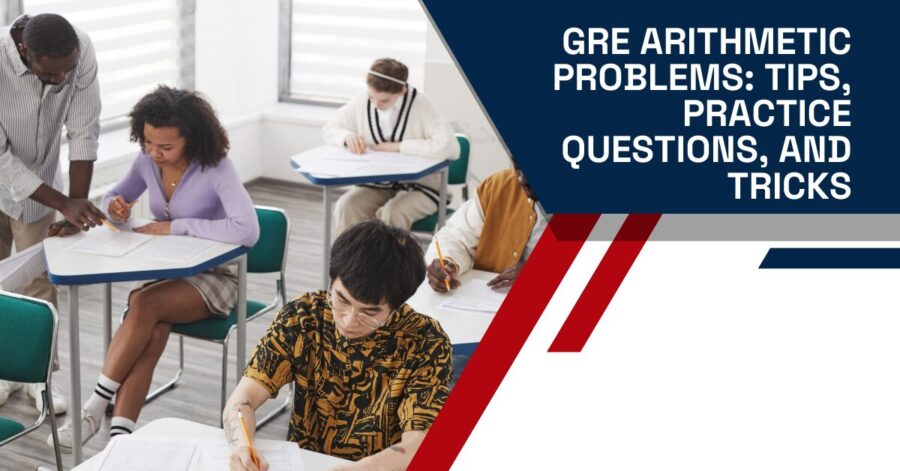5 September 2024
7 minutes read
GRE Arithmetic Problems: Tips, Practice Questions, And Tricks

Key Takeaways
- Master core arithmetic topics—prime numbers, fractions, square roots—for a strong GRE quant foundation.
- Consistent practice and reviewing mistakes are critical for improving your GRE score.
- Manage time effectively and use quality test prep resources to boost your GRE arithmetic performance.
Did you know that nearly 60% of GRE test-takers find the Arithmetic section the most challenging part of the GRE Quantitative Reasoning? Whether it’s the seemingly simple concepts of integers, square roots, or the intricate dance between algebra and geometry, the GRE math section question often feels like a daunting obstacle for many. If you’ve ever stared blankly at a Quantitative Comparison question, wondering how on earth the quantities could be equal, you’re not alone.
The pressure of test day, coupled with the sheer variety of question types—from multiple choice to numeric entry—can be overwhelming. Many students struggle to balance their GRE prep with other commitments, leading to last-minute cramming and panic. But what if there was a way to approach GRE arithmetic problems with confidence? So, before you apply for GRE exam, read this guide that will guide you through practical tips, tricks, and practice questions to help you boost your GRE score and tackle those arithmetic challenges head-on.
What Are GRE Arithmetic Question Types?
When tackling the GRE Quantitative section, it’s crucial to understand the various arithmetic question types you’ll encounter. These questions test your grasp of fundamental math concepts, ranging from basic integer operations to more complex topics like square roots and quantitative comparisons. Being well-versed in these areas not only helps improve your GRE exam score but also builds a solid foundation for more advanced topics like algebra and geometry. So, make it a part of your GRE action plan

GRE Multiple-Choice Questions
These questions require you to choose the correct answer from a set of options. They often cover basic arithmetic operations, including integer calculations, square roots, and other fundamental math concepts.
Example: What is the value of 23+5×22^3 + 5 \times 223+5×2?
-
- Answer Choices:
- A) 14
- B) 16
- C) 18
- D) 20
- E) 22
Numeric Entry Questions
In this format, you’ll need to input your answer directly, without any provided choices. These questions test your ability to solve problems independently and accurately in the GRE quantitative section.
Example: If the square root of a number is 7, what is the number?
Quantitative Comparison Questions
Here, you’ll compare two quantities, labeled as Quantity A and Quantity B, and determine the relationship between them. You must decide if one quantity is greater, less, or if the quantities are equal, which can be particularly tricky without a strong understanding of arithmetic.
Example: Compare Quantity A and Quantity B:
- Quantity A: The sum of 15 and 7
- Quantity B: The product of 3 and 7
- Answer Choices:
- A) Quantity A is greater
- B) Quantity B is greater
- C) The two quantities are equal
- D) The relationship cannot be determined from the information given
Mixed Arithmetic Questions
These questions may combine elements of arithmetic with other areas of math, such as algebra or geometry, testing your ability to integrate different concepts under time constraints.
Example: If x=2x = 2x=2 and y=3y = 3y=3, what is the value of x2+2xy+y2x^2 + 2xy + y^2×2+2xy+y2?
-
- Answer Choices:
- A) 13
- B) 25
- C) 28
- D) 36
- E) 49
What Are The 7 GRE Arithmetic Topics?
According to ETS, the organization behind the GRE® test, the Quantitative Reasoning section is designed to assess your basic arithmetic skills as well as your ability to apply them in problem-solving contexts. This is why having a solid grasp of the key arithmetic topics is crucial for success on the GRE. Many test-takers find that improving their performance on GRE arithmetic questions can lead to a higher overall score, especially when it comes to the more challenging sections of the GRE quant. Understanding these topics is as important as your GRE admit card.
Integers and Prime Numbers
Understanding the basic properties of integers, such as even/odd numbers, positive/negative numbers, and divisibility, is fundamental to the GRE quant section. Prime numbers, in particular, are a key focus in many GRE arithmetic questions, where you’ll need to identify prime numbers or use them in arithmetic operations. This topic is often tested in multiple-choice questions and quantitative comparison questions on the GRE.
Fractions and Decimals
Mastery of fractions, decimals, and their conversions is crucial for the GRE® test. Questions may involve adding, subtracting, multiplying, or dividing fractions, or converting between fractions and decimals. This topic frequently appears in the GRE arithmetic section, especially in word problems and GRE numeric entry questions, where precision and accuracy are essential.
Ratios, Proportions, and Percents
These concepts are central to many GRE arithmetic questions. You’ll often be asked to solve problems involving ratios, proportions, and percentages, which are common in word problems. Understanding how to manipulate these arithmetic topics will help you in questions based on real-world scenarios, which are prevalent in the quantitative reasoning section of the GRE.
Absolute Value
Absolute value questions test your understanding of the distance of a number from zero on a number line, regardless of its sign. This concept is frequently tested in the GRE quant section, especially in quantitative comparison questions where determining the magnitude of quantities is key. A solid grasp of absolute value can help you avoid mistakes, especially when dealing with negative numbers.
Exponents and Square Roots
The GRE arithmetic section often includes questions on exponents and square roots. These concepts are critical for solving a wide range of GRE math problems, from simplifying expressions to solving equations. Understanding how to work with exponents and square roots is essential for answering multiple choice questions and GRE numeric entry questions efficiently.
Data Interpretation and Analysis
Although data interpretation is a broader topic, it often involves arithmetic operations such as addition, subtraction, multiplication, and division. You may encounter data analysis questions in the quant section that require you to interpret graphs, charts, or tables and perform arithmetic operations to arrive at the correct answer. This skill is crucial for the quantitative reasoning section of the GRE.

Word Problems
Word problems are a significant part of the GRE arithmetic section. These questions test your ability to translate real-world scenarios into mathematical equations or expressions and solve them. Practicing word problems is essential, as they often incorporate multiple arithmetic concepts and require strong problem-solving skills. Utilizing free practice questions and explanations for each question, can be particularly helpful for mastering this topic.
5 Tips To Get The Highest GRE Arithmetic Score
Imagine you’re sitting for the GRE, and you encounter a problem that seems deceptively simple: adding and subtracting fractions. But as you work through the arithmetic, you realize you’re running out of time—panic sets in, and your confidence takes a hit. This scenario is all too common for many test-takers. The GRE quant section can be challenging, especially when it comes to arithmetic questions. To avoid these pitfalls and achieve the highest arithmetic score possible, here are five tips to guide your GRE prep:
Master the Basics
Start by solidifying your understanding of basic arithmetic concepts such as prime numbers, fractions, and the square root of a number. These fundamentals are the building blocks of many GRE math problems. Developing good number sense is essential, as it helps you quickly identify the best approach to solving arithmetic GRE questions. Practice mental math regularly to enhance your speed and accuracy.
Practice with Purpose
Consistent practice is key to mastering GRE arithmetic. Use full-length practice tests and questions with answers to simulate test conditions and identify areas where you need improvement. Focus on arithmetic and fractions, as these are common in the GRE quant books. Explanations for each question are crucial—reviewing them will help you understand your mistakes and avoid them on test day.
Develop a Time Management Strategy
The GRE quant section requires you to answer all questions within a limited time. To maximize your arithmetic score, you need to practice managing your time effectively. Allocate around 2 minutes for each question, and if you’re stuck, move on and come back later if time permits. This strategy ensures you don’t lose valuable points on questions you could have answered correctly.
Utilize Quality Test Prep Resources
Enroll in a reputable test prep course, whether in New York, Los Angeles, or even online. Resources like SSAT test prep and other GRE preparation programs offer structured study plans, practice tests, and expert guidance. Programs like test prep in San Francisco or test prep in Denver are tailored to help you strengthen your arithmetic skills and boost your overall GRE quant preparation.
Review and Refine
After completing your practice sessions, take time to review your performance. Look at 15 questions you found challenging and focus on understanding the concepts behind them. Use resources that offer detailed explanations for each question, and keep refining your approach. Regular review and practice will solidify your understanding and improve your arithmetic score.
Conclusion
Remember, it’s not just about cramming as much as you can—it’s about understanding the concepts and knowing how to apply them under pressure. Utilize quality resources, review your mistakes, and keep refining your approach. With the right preparation, you can walk into the GRE with confidence, ready to tackle whatever arithmetic challenges come your way. Keep it simple, stay consistent, and trust your preparation.
We think, mastering GRE arithmetic doesn’t have to be overwhelming. By focusing on the basics, practising consistently, and managing your time effectively, you can significantly improve your performance in the quant section.
Master the GRE: Ambitio’s Bootcamp Will Elevate Your Scores! Dive deep into the GRE’s core sections with our comprehensive training and strategies, ensuring you excel across the board.
FAQs
What is the purpose of the GRE?
Is the GRE required for all graduate programs?
How much does the GRE cost?
How often can I take the GRE?

You can study at top universities worldwide!
Get expert tips and tricks to get into top universities with a free expert session.
Book Your Free 30-Minute Session Now! Book a call now




























